Will publishing new articles regularly or updating old blog posts help you rank better?
Maybe, but not just by changing the date or frequency.
Google accounts for “hacks” like this.
In this article, we will discuss how the factors behind freshness affect your rank.
What Is Freshness?
When marketers talk about content freshness, they are referencing an algorithm update from 2017.
Google’s Freshness Update was a significant algorithm update that introduced time as a relevance indicator, making the search results more responsive to user intent.
The update allowed Google to surface trending, regular, or frequently updated content.
People often misunderstand the Freshness update, believing it prioritizes recent publication dates in raking results.
Unfortunately, this is an oversimplification and has fueled multiple viral “hacks” like mass creating content or updating publication dates as good SEO strategies.
So, I’m going to explain why freshness doesn’t mean what you think it means and then explain how to get freshness to work for you.
Freshness Vs. Frequency
Frequency is often confused with freshness.
Frequency is the rate at which you publish content, whereas freshness is the date a page was originally published.
Posting content frequently will help your site get crawled more often out of necessity – hat tip to the 2017 Google Caffeine update, which made this (freshness) all possible.
But, indexing is not ranking.
While the frequency may increase how often Google checks your website, it is not the same as freshness and is not a ranking factor.
John Mueller, Search Advocate at Google, confirmed this in a tweet.
When asked whether Google’s algorithms take posting frequency into account, he responded that they do not.
Take, for example, the Backlinko website.
Brian Dean posts sporadically – about six times in 2021 – and has only published one article (so far) in 2022.
Yet, the website still ranks in the top three for 3,850 non-branded keywords.
 Screenshot from Ahrefs, June 2022
Screenshot from Ahrefs, June 2022How Does Google Determine Publication Date?
Google looks at many things when determining a publication date of a webpage – including, but not limited to, the dates you provide or dates provided through structured markup.
But, Google does not rely on just one thing because all factors have the potential to go wrong.
What if a publisher doesn’t provide a clear date?
Or, what if the structured data on the page is missing or incorrect?
Google looks at several factors, not just dates provided, to determine when a page was published or significantly updated.
Significantly updated is an important distinction.
Below are Google’s webmaster guidelines for news (as it’s the most affected).
 Screenshot from Google Guidelines, June 2022
Screenshot from Google Guidelines, June 2022This image shows that Google clearly states not to artificially freshen a story without adding significant information or compelling reason to give it a fresh date and time.
Does The Publication Date Matter?
Look at SEO, for example. It is a fairly volatile industry with many moving parts, algorithm updates, and experts publishing their findings to the interwebs en masse.
You may think that SEO-related queries would certainly demand freshness.
Let’s search [SEO audit].
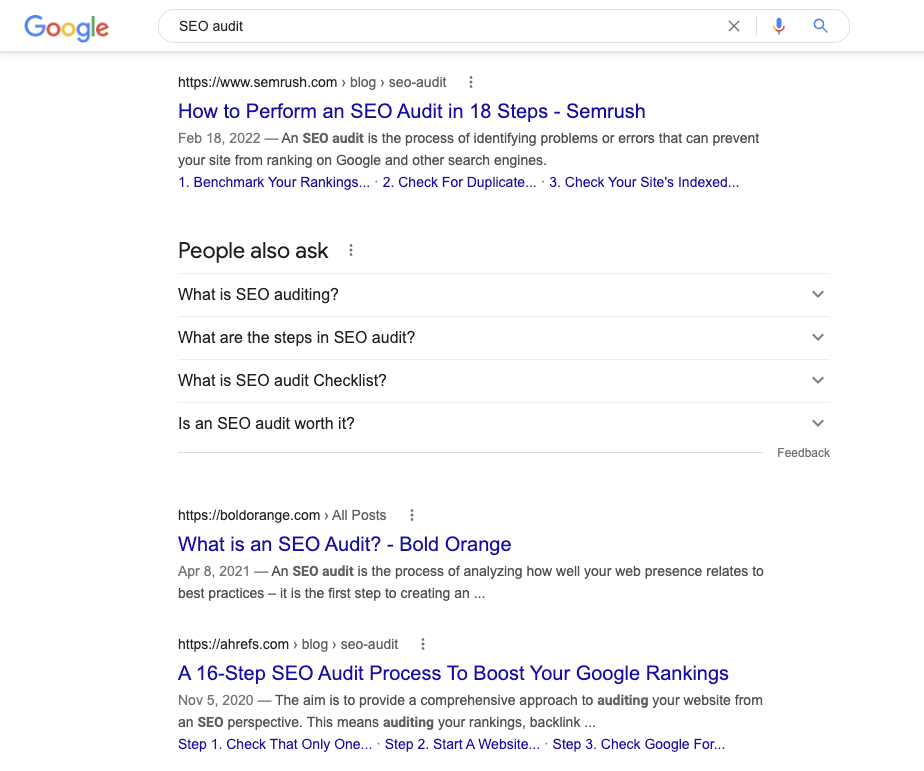 Screenshot from search for [SEO audit], Google, June 2022
Screenshot from search for [SEO audit], Google, June 2022You’ll see articles from 2020, 2021, and 2022.
And then a Wordstream article with a 2018 date in the SERP (search engine results page).
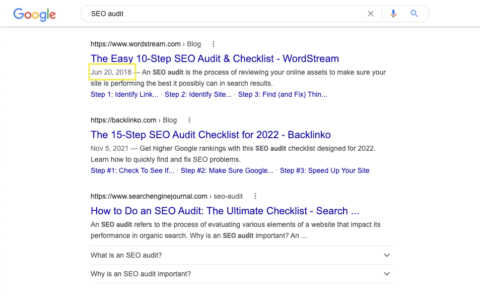 Screenshot from search for [SEO audit], Google, June 2022
Screenshot from search for [SEO audit], Google, June 2022You see, Wordstream tried to freshen this page by publishing an artificially updated publication date.
 Screenshot from source code, June 2022
Screenshot from source code, June 2022Regardless, it still ranks on the first page. Maybe Google doesn’t consider the query [SEO audit] to deserve freshness.
Let’s search [SEO trends].
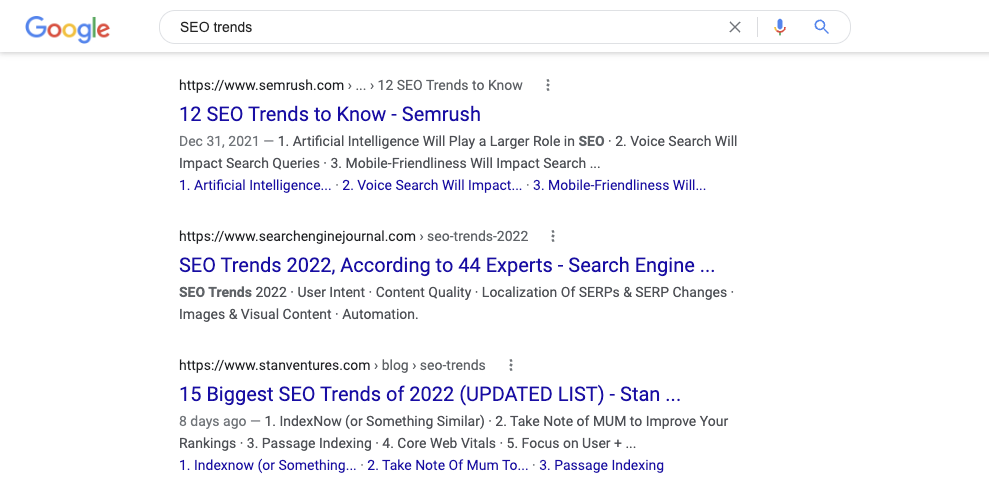 Screenshot from search for [SEO trends], Google, June 2022
Screenshot from search for [SEO trends], Google, June 2022There are no articles up to late 2021 and 2022.
An article on the first page doesn’t even list the date. It’s just how many days ago the article was published.
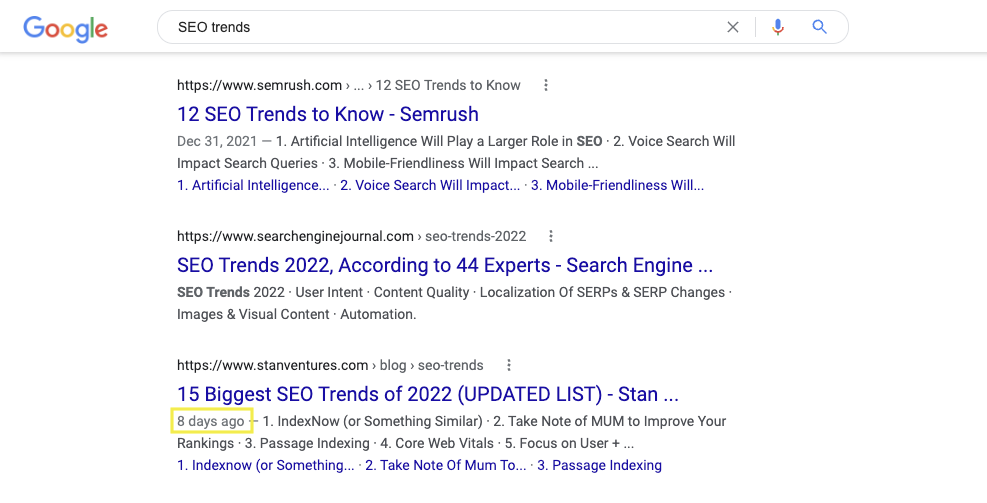 Screenshot from search for [SEO trends], Google, June 2022
Screenshot from search for [SEO trends], Google, June 2022An article from 2018 would be a horrible search result for the search query [SEO trends].
Google understands people want to know the latest trends, not outdated ones, and tries to match the results to fit the user’s intent.
What Types Of Queries Does Freshness Apply To?
In its official post about the update, Google specifies three types of queries that freshness algorithms apply to: recent events (e.g., natural disasters), regularly recurring events (e.g., sports scores), and frequently updated topics (e.g., product reviews).
For example, let’s look at the query [how to build a standing desk].
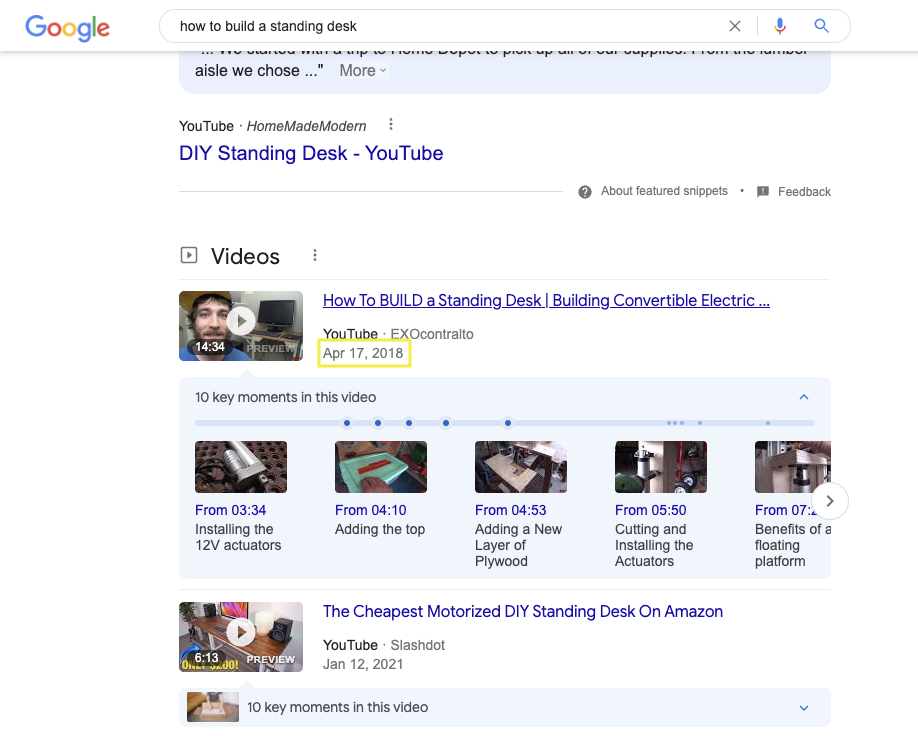 Screenshot from search for [how to build a standing desk], Google, June 2022
Screenshot from search for [how to build a standing desk], Google, June 2022But, if I search for [best standing desk].
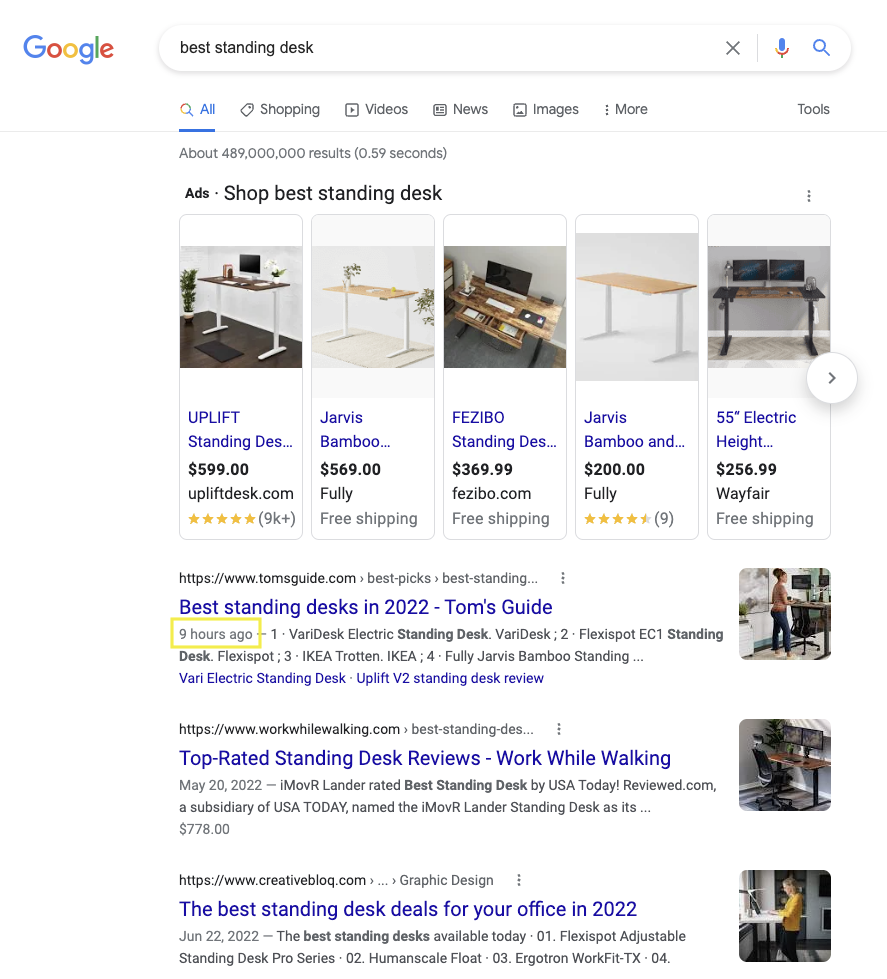 Screenshot from search for [best standing desk], Google, June 2022
Screenshot from search for [best standing desk], Google, June 2022The SERP displays ads to purchase the product and reviews on standing desks as recent as “9 hours ago.”
Not a single site link on page 1 is more than two months old. Someone searching for [best standing desk] likely wants to read a product review, so freshness becomes important to the user experience.
Final Thoughts
Google doesn’t care how frequently you post or if you keep changing the date.
Does that mean you should stop updating old articles?
No!
Keeping your articles up-to-date means updating the content, quality, and relevancy to align with user intent and industry advances.
Has something changed since you first wrote the article?
Update it and make the edits visible so that readers can see the historical view of events.
If you notice that Google begins displaying images, videos, or rich results in the SERP for your target keyword – update how you’re presenting the content.
More resources:
- Darwinism & Google SERPs As Product: Revisiting How Search Works
- How Autocomplete Works: The Patent Behind Google’s Query Completions
- How Search Engines Work
Featured Image: patpitchaya/Shutterstock





